TeachEngineering
Teach Engineering: The Other Water Cycle
For students that have already been introduced to the water cycle, this instructional activity is intended as a logical follow-up. Students will learn about human impacts on the water cycle that create a pathway for pollutants beginning...
BioEd Online
Bio Ed Online: Water
The Science of Water Teacher's Guide provides a number of inquiry-based activities for grades 3-5 (although it can be expanded for other grades). The guide contains science lessons that enable students to explore water, behavior of...
Science Education Resource Center at Carleton College
Serc: Exploring the Environment: Water Quality
A project based scenario where students research problems and come up with answers to a local water board's concerns over water quality in the watershed. Background information is accessible for the following topics: importance of water,...
BioEd Online
Bio Ed Online: Why Is Water Important?
Provided here is a pre-assessment to gauge student's knowledge of the role and importance of water in their daily lives. Can be revisited as part of the post-assessment. Student sheets are provided in English and in Spanish.
BioEd Online
Bio Ed Online: Why Is Water So Important?
In this post assessment activity students review points covered in the attached unit and reach conclusions regarding the importance of water to human health. Student sheets are provided in English and in Spanish.
TeachEngineering
Teach Engineering: Air Pollution
Students are introduced to the concept of air quality by investigating the composition, properties, atmospheric layers and everyday importance of air. They explore the sources and effects of visible and invisible air pollution. By...
TeachEngineering
Teach Engineering: Introduction to Water Chemistry
Students are presented with examples of the types of problems that environmental engineers solve, specifically focusing on water quality issues. Topics include the importance of clean water, the scarcity of fresh water, tap water...
Science4Fun
Science4 Fun: Water Cycle
What is the water cycle? Learn how the water moves to the atmosphere, how water moves across the land, the importance of the water cycle, and the effects of pollution.
TeachEngineering
Teach Engineering: Moving Without Wheels
In a class demonstration, students observe a simple water cycle model to better understand its role in pollutant transport. This activity shows one way in which pollution is affected by the water cycle; it simulates a point source of...
Other
Water Pollution
Read about the different types of water pollution and the harm it can cause. Learn about oil spills how they are cleaned up, and how you can help prevent water pollution. Additional links point to other topics relevant to the study of...
TeachEngineering
Teach Engineering: On the Move
Looking at models and maps, students explore different pathways and consequences of pollutant transport via the weather and water cycles. In an associated literacy activity, students develop skills of observation, recording and reporting...
CK-12 Foundation
Ck 12: Biology: Soil and Water Resources
[Free Registration/Login may be required to access all resource tools.] Covers soil and water resources and the threats to these resources.
Bio Topics
Bio Topics: Water
An interactive worksheet and notes that look at the water cycle, domestic water supply, sewage disposal, water pollution, and air pollution. Useful for student review of material.
CK-12 Foundation
Ck 12: Earth Science: Coastal Pollution
[Free Registration/Login may be required to access all resource tools.] How pollution creates dead zones in the ocean.
CK-12 Foundation
Ck 12: Earth Science: Coastal Pollution
[Free Registration/Login may be required to access all resource tools.] How pollution creates dead zones in the ocean.
NOAA
Noaa: Freshwater
This site is designed to assist the educator in teaching concepts and processes related to freshwater environments and to increase stewardship of these important resources. There are links to resources regarding the Great Lakes...
University Corporation for Atmospheric Research
Ucar: Biogeochemical Cycles
The ways in which an element or compound such as water moves between its various living and nonliving forms and locations in the biosphere is called a biogeochemical cycle. All of the atoms that are building blocks of living things are a...
BioEd Online
Bio Ed Online: River Ecology
In this lesson plan students are required to simulate activities that can affect a water source, such a river as it flows from one place to another within a community.
University of Arizona
University of Arizona: Pulse: Cultures and Cycles: Arsenic and Human Health
Interdisciplinary unit about the risk of exposure to arsenic in public drinking water. Math, language arts, social studies, and science are incorporated into the lessons.
US Geological Survey
Lake Pontchartrain Basin Foundation: Liquid Assets: Our Water Resources
Lessons designed to show students how water quality, water pollution, and personal lifestyle are related. Lessons help students understand the importance of our water resources and water quality. Students will explore the nonpoint and...
PBS
Iowa Public Television: Water Mini Web Quest [Pdf]
Browse the Explore More: Water Quality website to answer these questions about how water is used, who uses it and how these uses impact the quality of water. Find ways to make a difference in water quality through the choices you make.
US Environmental Protection Agency
Epa: Excuse Me, Is This the Way to the Drain Pipe? [Pdf]
Ever wonder where your drinking water comes from? And what happens to it after you're done? "Excuse Me, Is this the Way to the Drain Pipe?" is a great story and lesson plan about a drop of water going through the water cycle and through...
Mocomi & Anibrain Digital Technologies
Mocomi: Major Domains of the Earth Hydrosphere
Learn about the hydrosphere, the water cycle, the major threats to the hydrosphere, and environmental problems.
Science Education Resource Center at Carleton College
Serc: Mn Step: Watersheds Urban and Rural
In this activity young scholars build models of two types of watersheds, one urban and one rural. They will then simulate rain or the water cycle and observe what happens to the 'soil.' This activity leads to discussions about the water...


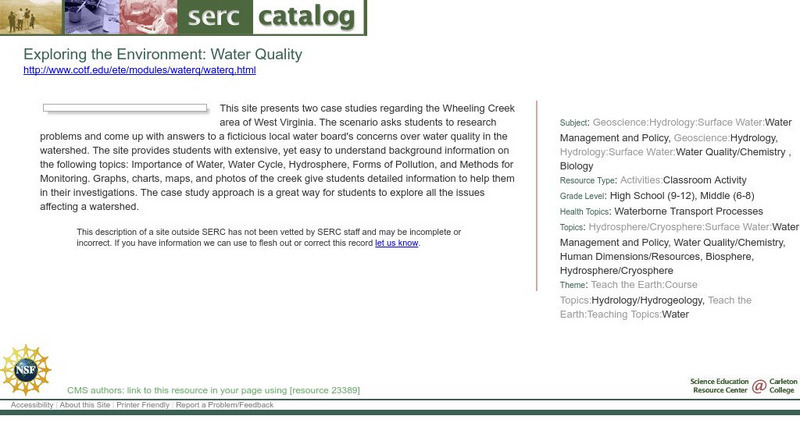



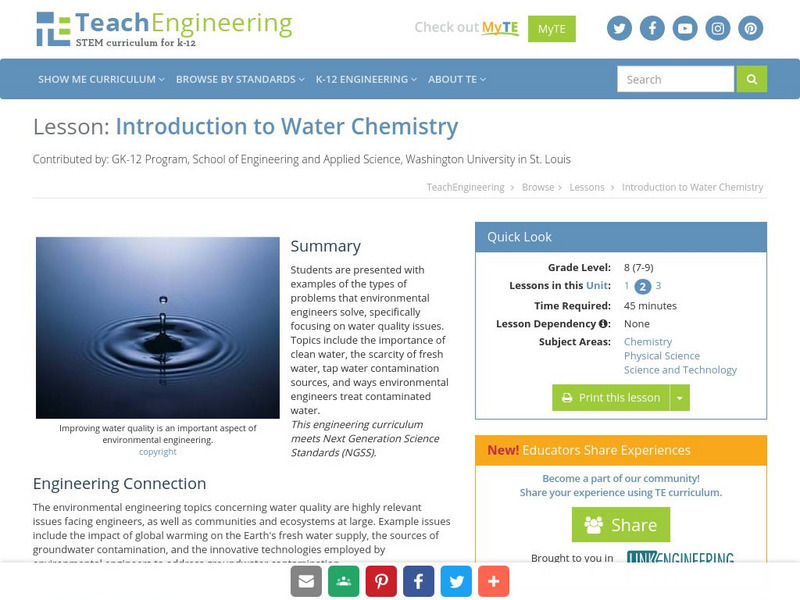

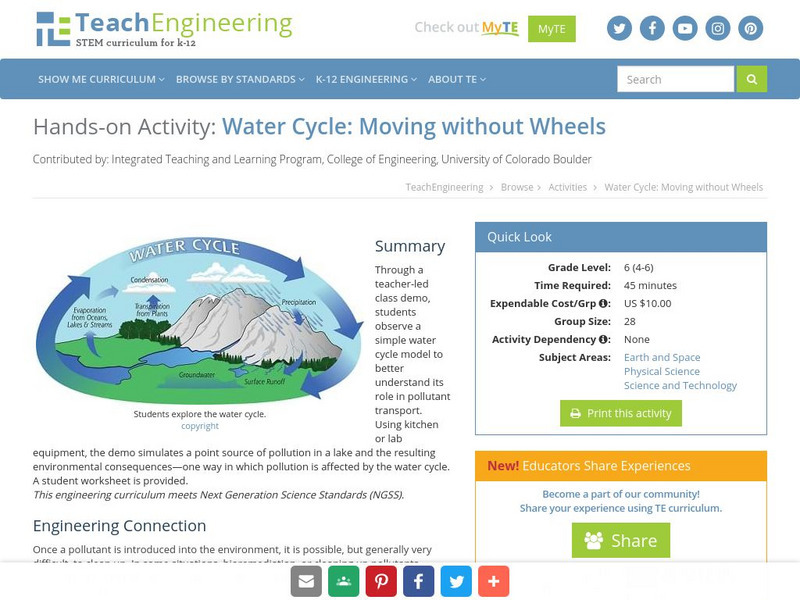

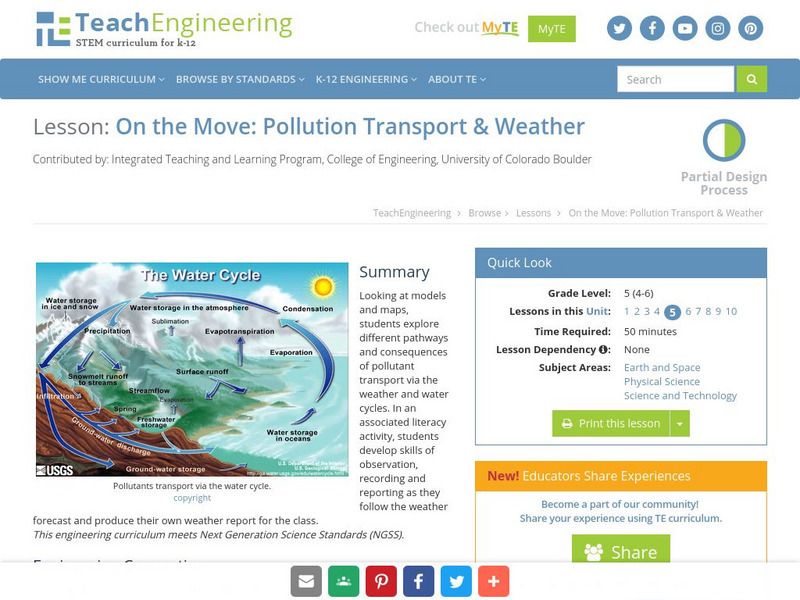

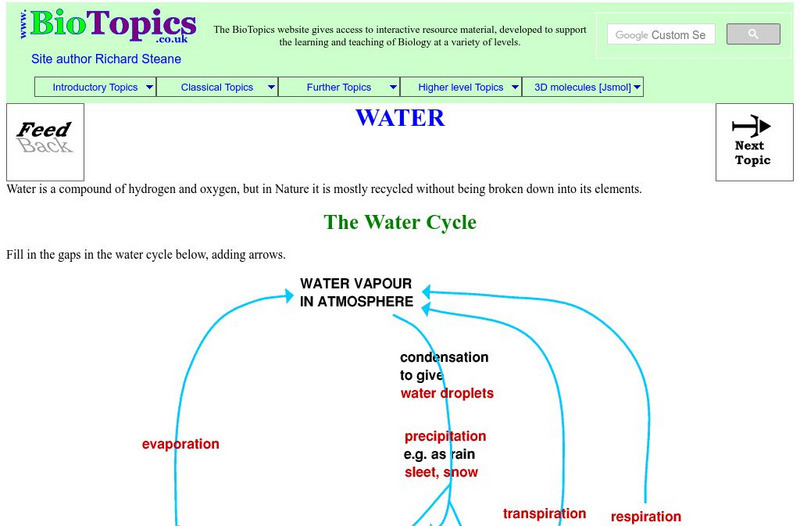



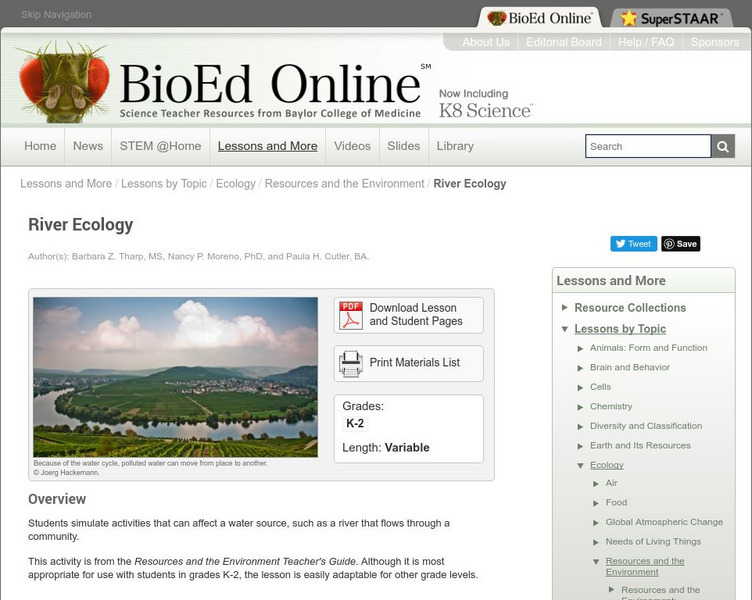


![Epa: Excuse Me, Is This the Way to the Drain Pipe? [Pdf] Lesson Plan Epa: Excuse Me, Is This the Way to the Drain Pipe? [Pdf] Lesson Plan](https://content.lessonplanet.com/knovation/original/38691-8e8499c77a908b9761fec8738a536bad.jpg?1661255988)
